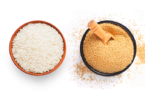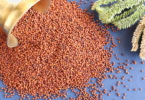The cruciferous family, known for their multiple health advantages, includes broccoli, which is sometimes referred to as the “superfood” of vegetables. Broccoli has acquired appeal as a flexible component in a number of cuisines because of its vivid green colour, unusual florets, and delicious taste. The amazing health benefits of broccoli, including its excellent nutritional profile and potential anti-cancer qualities, will be discussed in this article. So let’s explore this amazing vegetable’s universe and learn why it belongs in your diet prominently.
A Nutritional Powerhouse
Are you trying to improve your overall health naturally? Broccoli is the ultimate nutrient powerhouse; look no further. This cruciferous vegetable is a genuine champion when it comes to boosting wellbeing since it is loaded with a wide variety of antioxidants, important vitamins, and necessary minerals.
The amazing nutritional profile of broccoli is one of the main factors in its dominance as a healthy food. This brilliant green vegetable provides a wealth of essential nutrients that your body needs, including dietary fibre, folate, vitamin K, and vitamin C. Additionally, it contains a sizable quantity of manganese, potassium, vitamin A, and several other crucial B vitamins.
Let’s delve into the nutritional wonders that make broccoli an indispensable addition to your balanced diet:
1. High in antioxidants: Broccoli is loaded with antioxidants, potent chemicals that fend off dangerous free radicals and save your body from oxidative stress. These antioxidants assist in protecting your cells from oxidative stress and lower the risk of chronic illnesses including heart disease and some kinds of cancer.
2. Dietary fibre: A single serving of broccoli contains a sizable quantity of dietary fibre, which is essential for preserving a sound digestive system. In order to maintain good gut health, fibre helps with digestion, avoids constipation, and encourages regular bowel movements.
3. Folate: Broccoli is a superb source of folate, which is essential for many body processes, especially cell development and repair. As it helps to form the embryonic neural tube, folate is crucial during times of fast growth, such as pregnancy. Additionally, it helps with DNA synthesis and red blood cell development, enhancing general vitality.
4. Vitamin K: Broccoli is well known for its extraordinary vitamin K concentration, which is necessary for healthy bone development and blood clotting. This crucial vitamin aids in ensuring that blood clots properly and minimises bleeding. The incidence of fractures and osteoporosis is also decreased since it is essential for keeping strong, healthy bones.
5. Vitamin C: Rich in vitamin C, broccoli strengthens the immune system naturally. This powerful antioxidant boosts collagen formation, encouraging healthy skin, tissues, and blood vessels while also boosting your immune system. Vitamin C also facilitates iron absorption, promoting healthy energy levels and avoiding iron deficiency anaemia.
6. Manganese, potassium, and other nutrients: Broccoli is still wowing us. It also contains significant levels of manganese, a mineral that supports healthy bones and metabolism. Also prevalent in broccoli is the mineral potassium, which supports healthy blood pressure and heart function. In addition to these, broccoli offers a plethora of additional B vitamins that are essential for the generation of energy, brain function, and general health.
Broccoli is a fantastic complement to any balanced diet due to its extensive assortment of nutrients. Your general health and energy are supported by its exceptional combination of antioxidants, important vitamins, and key minerals. Include this beautiful vegetable in your meals if you want to strengthen your bones, promote digestion, or increase your immune system. Your body will appreciate it!
Promoting Optimal Health
Cancer Prevention.
Sulforaphane and indole-3-carbinol, two substances found in broccoli, have been widely researched for their possible anti-cancer properties. Breast, prostate, lung, and colon cancer risk may be decreased with the aid of these substances. Regular eating of broccoli and other cruciferous vegetables has demonstrated encouraging benefits in reducing cancer-causing agents in the body and limiting the formation of tumours.
Heart Wellness
Broccoli’s fibre, antioxidants, and anti-inflammatory qualities all support heart health. The antioxidants help reduce oxidative stress and inflammation, both of which are connected to heart disease, while the high fibre content helps lower cholesterol levels. By consuming broccoli, you may be able to reduce your chance of developing heart diseases and maintain cardiovascular health.
Immune system boosting
The high vitamin C content of broccoli is responsible for its immune-supportive qualities. White blood cell formation and immune system maintenance are both greatly aided by vitamin C. Your body’s defences against infections and common ailments may be strengthened by including broccoli in your diet, which can also hasten recovery time.
Versatility and Gastronomic Pleasures
The adaptability of broccoli in the kitchen is one of its charms. It goes well with a variety of tastes and cuisines and can be eaten raw, steamed, roasted, or sautéed. Broccoli adds a delicious crunch and a mild, earthy flavour that go well with a variety of dishes, whether it is added to salads, stir-fries, soups, or eaten as a side dish.
How to Include Broccoli in Your Diet
It’s crucial to routinely include broccoli in your diet if you want to benefit from it. Here are some suggestions for incorporating this nutrient powerhouse into your meals:
– To add a tangy and wholesome edge to your salads, add broccoli florets.
– To keep broccoli crisp and nutritious, softly steam or sauté it.
– For a colourful and healthful boost, add broccoli to your stir-fries, omelettes, or frittatas.
– For a creamy texture and additional nutrients, puree or blend cooked broccoli into soups or sauce.
Exploring Potential Drawbacks and Considerations
Although broccoli is an optimal healthy vegetable and offers a host of health advantages, it’s necessary to take into account any potential disadvantages and restrictions. This article will examine the drawbacks of eating broccoli, such as digestive issues, goitrogenic qualities, and the effect on certain medical disorders. You can decide whether or not to include broccoli in your diet by being aware of these factors.
Digestive Concerns
Bloating and Gas
The cruciferous family, which includes broccoli, contains raffinose, a complex sugar that can be challenging to digest. After having broccoli, some people may suffer gas, bloating, or discomfort, particularly in big amounts or when it is overcooked. Consuming broccoli in moderation and cooking it properly may help to ease these stomach issues.
IBS, or irritable bowel syndrome
Those who have IBS or other sensitive digestive systems may experience symptoms including stomach discomfort, cramping, and changes in bowel habits due to broccoli’s high fibre content. To assess the acceptability of broccoli eating depending on specific health concerns, it is advised to speak with a healthcare practitioner.
Thyroid Function is Affected
The goitrogens found in broccoli and other cruciferous vegetables are present. These compounds may be of concern to patients who have thyroid conditions or are at risk of iodine shortage because they can interfere with the synthesis of thyroid hormones. Although cooking broccoli might lessen its goitrogenic effects and make it safer to consume, it is still advised to speak with a doctor.
Relationship to Specific Medical Conditions
Renal stones
Due to its relatively high oxalate level, anyone with a history of kidney stones should use caution while taking broccoli. Oxalates can help kidney stones made by calcium oxalate develop. To choose the best diet for a person’s circumstances, it is essential to speak with a qualified dietician or a healthcare provider.
Bleeding agents
Vitamin K, found in broccoli, is essential for blood clotting. People who take blood thinners like warfarin need to be careful about abrupt changes in their vitamin K consumption since they can affect how well the medicine works. For patients using blood thinners, consistency in dietary practices and routine medical monitoring are advised.
Conclusion.
Broccoli has earned its reputation as a nutritional powerhouse because of its impressive nutrient profile and possible health advantages. This cruciferous vegetable has a number of benefits, including boosting heart health, preventing cancer, and strengthening immunological function. Considering how versatile broccoli is in the kitchen, there are countless ways you may use it in your dishes. So why not incorporate this vivid green treasure into your diet on a daily basis? Your body will appreciate it.






